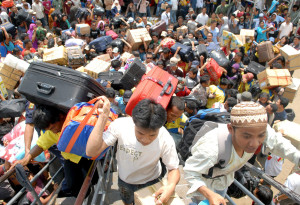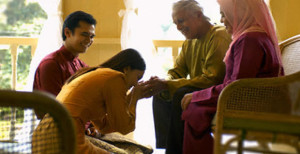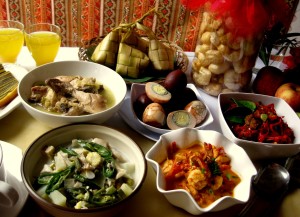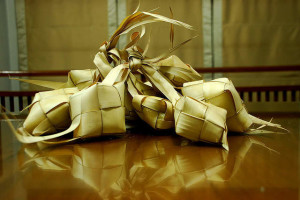MUDIK
At the end of the month of Ramadhan and its special religious observance is the Eid holiday, called Idul Fitri or Lebaran in Indonesia. One of the largest temporary human migrations globally is the prevailing custom of the Lebaran where workers, return to their home town or city to celebrate with their families and to ask forgiveness from parents, in-laws, and other elders. This is known in Indonesia as mudik or pulang kampung (homecoming). It is an annual tradition that people in big cities such as Greater Jakarta, Bandung, Surabaya, or elsewhere, travel to their hometowns or other cities to visit relatives, to ask forgiveness, or just to celebrate with the whole family. The government of Indonesia provides additional transportation to handle the massive surge of travellers in several days prior and after the lebaran. Last year there were around 30 million people travels to their hometowns during Lebaran holiday.
LEBARAN DAY
On the Lebaran day, after performing Eid prayer in the morning, people dressed in their new or best clothes will gather to greet their family and neighbours. It is common to greet people with “Selamat Idul Fitri” which means “Happy Eid”. Muslims also greet one another with “mohon maaf lahir dan batin”, which means “Forgive my physical and emotional (wrongdoings)”, because Idul Fitri is not only for celebrations but also a time for atonement to ask for forgiveness for sins which they may have committed but was cleansed as a result of the fasting in the Muslim month of Ramadan.
KETUPAT LEBARAN
Ketupat is a popular traditional celebrative dish for Eid al-Fitr meal in Brunei, Indonesia, Malaysia, Singapore and Southern Thailand. It is a type of dumpling made from rice packed inside woven palm leaf pouch. It is the common dishes during the Lebaran. Ketupat is usually served with “Rendang” (dried beef) or Opor Ayam (Chicken Curry), or Satay with peanut gravy. An Indonesian Moslem family will serve it in the entire day to the guest who visit them during the Lebaran Feast.




